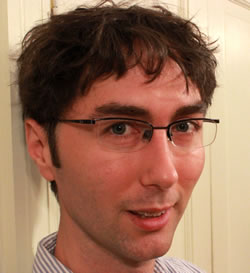Brian Gresko

|
Brian Gresko is the editor of When I First Held You: 22 Critically Acclaimed Writers Talk About the Triumphs, Challenges, and Transformative Experience of Fatherhood, out now from Berkley Books. His work has appeared in Poets & Writers Magazine and The Brooklyn Rail, and on The Huffington Post, Salon, TheAtlantic.com, The Daily Beast, the L.A. Review of Books, and The Rumpus. He lives in Brooklyn with his family. briangresko.com | |
|
photo credit: Sara Epstein |
Having Children Might Actually Help Your Writing |
 |
|
I sat cross-legged on my favorite armchair, alone in the house, but no matter how I tried I couldn't concentrate enough to get this essay going. My son and wife were cleaning their bicycles outside the window, and the four-year-old's discourse on how the gears worked was just too distracting. I'm able to write in crowded cafes, as I am now, or while listening to music, but I cannot tune out my son. Nor could I quell the pangs of guilt that I should be out there with him, getting my hands greasy. I curate the Pen Parentis Literary Salon in downtown Manhattan, which features writers with kids reading their work and then discussing their creative and parenting lives. At a recent event the poet Miranda Field, author of the collection Swallow, compared the situation to having a lover, one with whom you steal away to your room on Saturday afternoons. Your family must understand that in some fundamental way you are not just theirs; they must share you. Does this mean that you are lessened as both a writer and a parent? Not necessarily, providing you have the discipline to carve out time and space for your work, and avoid things like writing in earshot of your tyke. Novelist Helen Schulman, author, most recently, of the acclaimed novel This Beautiful Life, told me that she writes on the couch—she gave up her office so her daughter could have a bedroom—sometimes late at night, or on the weekends, or even just in the half an hour between a yoga class and teaching. "I have sympathy for all of us who struggle to write. But somehow if you need to, you do it." Finding the opportunity is only the first step. As a grad student, I might twiddle my thumbs for an hour, trying to commit to a direction before moving ahead. I now choose my course faster, because I don't have time for dilly-dallying. Novelist Eleanor Henderson, author of Ten Thousand Saints and co-editor (with Anna Solomon) of the anthology Labor Day, concurs. "While I now have far fewer hours to write, I quickly learned how to make those hours count. No sharpening and resharpening the pencil: those hours are precious, and for me that kind of pressure can be productive." Indeed it can be. My son was born a week after I graduated with an MFA and before I had published a word. His birth motivated me to create a writing career, not just for me, but in order to show my son that such a feat was possible. Novelist Alexi Zentner, author of Touch and the forthcoming The Lobster Kings, found fatherhood inspired him as well. "When I first started writing seriously, I was a stay-at-home dad, and the time I took for writing was stolen and—when I could afford a babysitter—expensive, so I had to make sure I did something with it. I'm not actually sure if I would have made it as a writer if I didn't have kids, because having my daughters taught me that my creative time is precious." Creativity doesn't have to happen in front of the page. The more thinking and planning I do before I sit down to scribble, the better. As Henderson says, you have to "redefine what counts as 'writing.' When I'm naming a character while rocking a baby to sleep, that's writing." Children don't just deepen your habits, they can also change the very nature of your art. I find myself striving for emotional tones that I never would have considered in the past. After my son came on the scene, talking about love and responsibility to others didn't seem corny, it felt necessary, and exploring the relationship between parent and child presented an important, human subject with which to grapple. As Anthony Doerr, author, most recently, of the novel All The Light We Cannot See, says, "When you watch your kids begin to grow up, you cannot help but sense the impermanence of your own life more acutely; you cannot help but see how you are one link in a very long chain of parents and children, and that the best thing you have ever done and ever will do is to extend that chain. That’s really what it means to be a conscientious parent, and that's what it means to be a conscientious writer, too; you try to understand your place in the long history of writers who came before you and who will come after, you try to sense how narrow that window is, and you try to leap through it while you can." It's not always easy to have both a functioning family and writing life, but it is possible, and you may even find the two complementary in ways you would have never imagined. | |
